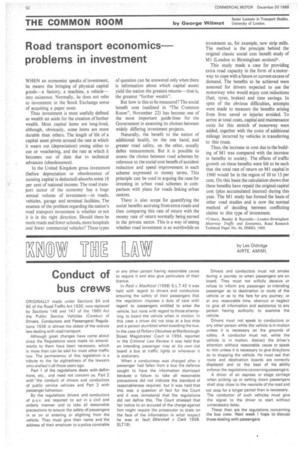Conduct of bus crews
Page 54

If you've noticed an error in this article please click here to report it so we can fix it.
by Les Oldridge AIRTE, AMIMI.
ORIGINALLY made under Sections 84 and 85 of the Road Traffic Act 1930, now replaced by Sections 146 and 147 of the 1960 Act the Public Service Vehicles {Conduct of Drivers, Conductors and Passengers) Regulations 1936 is almost the oldest of the statute law dealing with road transport.
Although great changes have come about since the Regulations were made no amendments to them have been necessary, which is more than can be said for most other traffic law. The permanency of this legislation is a tribute to the far sightedness of the lawyers who drafted it all those years ago.
Part 1 of the regulations deals with definitions, etc., and need not concern us, Part 2 with the conduct of drivers and conductors of public service vehicles and Part 3 with passenger behaviour.
By the regulations drivers and conductors of p.s.v, are required to act in a civil and orderly manner and to take all reasonable precautions to ensure the safety of passengers in or on or entering or alighting from the vehicle. They must give their name and the address of their employer to a police constable or any other person having reasonable cause to require it and also give particulars of their licence.
In Reid v MacNicol 11958) S.L.T.42 it was held with regard to drivers and conductors ensuring the safety of their passengers that the regulation imposes a duty of care with regard to passengers entitled to enter the vehicle, but none with regard to those attempting to board the vehicle when in motion. in this case a driver did not stop at a bus stop and a person stumbled when boarding the bus. In the case of Police v Okoukwo at Marlborough Street Magistrates' Court in 1954, reported in the Criminal Law Review it was held that an intending passenger may at his own risk board a bus at traffic lights or whenever it is stationary.
When a conductress was charged after a passenger had fallen from a bus the defence sought to have the information dismissed because a failure to take • all reasonable precautions did not indicate the standard of reasonableness required, but it was held that this was a question of fact for the Court and it was immaterial that the regulations did not define this. The Court stressed that fair notice to an accused of the charge against him might require the prosecutor to state on the face of the information in what respect he was at fault (Marshall v Clark 1958. SLT19).
Drivers arid conductors must not smoke during a journey or when passengers are on board. They must not wilfully deceive or refuse to inform any passenger or intending passenger as to destination or route of the vehicle or as to the fare for any journey: or at any reasonable time, obstruct or neglect to give all information and assistance to any person having authority to examine the vehicle.
Drivers must not speak to conductors or any other person while the vehicle is in motion unless it is necessary on the grounds of safety. A conductor must not, while the vehicle is in motion, distract the driver's attention without reasonable cause or speak to him unless it is necessary to give directions as to stopping the vehicle. He must see that route and destination boards are correctly displayed and to the best of his ability enforce the regulations concerning passengers.
A driver of an express or stage carriage when picking up or setting down passengers shall stop close to the nearside of the road and not stop for a longer period than is necessary. The conductor of such vehicles must give the signal to the driver to start without unnecessary delay.
These then are the regulations concerning the bus crew. Next week I hope to discuss those dealing with passengers.


























































































